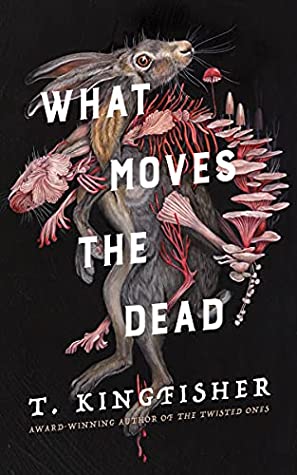|
Say, have you ever read Poe’s tale of the tragedy of Ushers and found it lacking? Well, T. Kingfisher did and wet off to do something about it. Where it was too short, she expanded it. Where it was left unexplained or up to readers’ imaginations, she explained it. And where it was firmly a work of its time, she updated it for modern sensibilities…albeit while staying in Victorian England territory.
Intrigued? I know I was. Plus, I’m a fan of the author. I’ve read two other books by her and found them very good. I was very interested to see how her distinctly Southern US charm will translate for Victoriana and oddly enough, it did. There’s an authentic humorous warmth to Kingfisher’s writing and it comes through here too, but in measured (mostly perfectly appropriate) amounts. If you’re not familiar with the basic plot, well…there’s a creepy old manse where brother and sister live, the descendants of Ushers, and somethings terribly off about the place. Or, in this novel, Alex Easton, a war veteran, comes to visit his once upon a time comrade and friend Roderick Usher, after a long time apart, only to find that Madeline Usher is dying, and her brother is but a helpless ghostly apparition at her side. There’s another visitor, too. An American. A man who also intends to help, albeit it may be much too late for all that. And there’s a strange local woman with a peculiar obsession with mycology. Mycology is important here, mushrooms, mushrooms everywhere. So, what is moving the dead? What is up with the Ushers? Well, read and find out. It’s well worth a read and, being under 200 pages and featuring Kingfisher dynamic engaging narrative, it’s a quick one. In my opinion it was a very well done and clever remake/redux of the classic. Who knows what Poe would think? But here are a few things that have nothing or not much to do with the plot…can we talk for a moment about how bizarrely woke this book is? I’m not talking about queer aspect so much, although Easton’s gender is a subject oft mentioned, for Alex Easton is a sworn, a soldier of a peculiarly genderless army, who dresses like a man and lives like a…well, not sure, it isn’t mentioned. In fact, Alex’s gender is so completely irrelevant to the story that one might wonder why is there mention of it at all. There are no romantic interludes, nothing like that. Moreover, Kingfisher here decides to have fun with pronouns. The place Alex hails from has seven of them, including a separate one for soldiers. There are cleverly designed and fun pronouns to author’s credit, but what this has to do with the story is anyone’s guess. Macmillan-Tor has been making a very deliberate effort in the last few years to up their queer representation and that’s all very good – when the story calls for it or when it is relevant to the plot, much like sex scenes. But to just throw it in for seemingly no reason but to get your woke stripes seems off, like cheap pandering at best. If Alex had some sort of torrid gothic romance with either Madeline or Roderick, sure…but for the story as it is and a slim one at that, to dedicate that much space to pronouns seems wrong. And no, this isn’t prudishness speaking, this is pertinence. If anyone can even tell a difference these days. Maybe Macmillan-Tor literally has a queer mention requirement in their books. Who knows. This isn’t even to say I don’t enjoy queer Victoriana, I do, very much. When it’s meant, when it’s what makes a story. Not when it’s strategically placed for notice. But anyway, forgive the digression if it doesn't interest or amuse you. And read the book. It’s a very entertaining and enjoyable read. Recommended. Thanks Netgalley
0 Comments
Leave a Reply. |
AuthorWrite something about yourself. No need to be fancy, just an overview. Archives
December 2023
Categories |

 RSS Feed
RSS Feed
